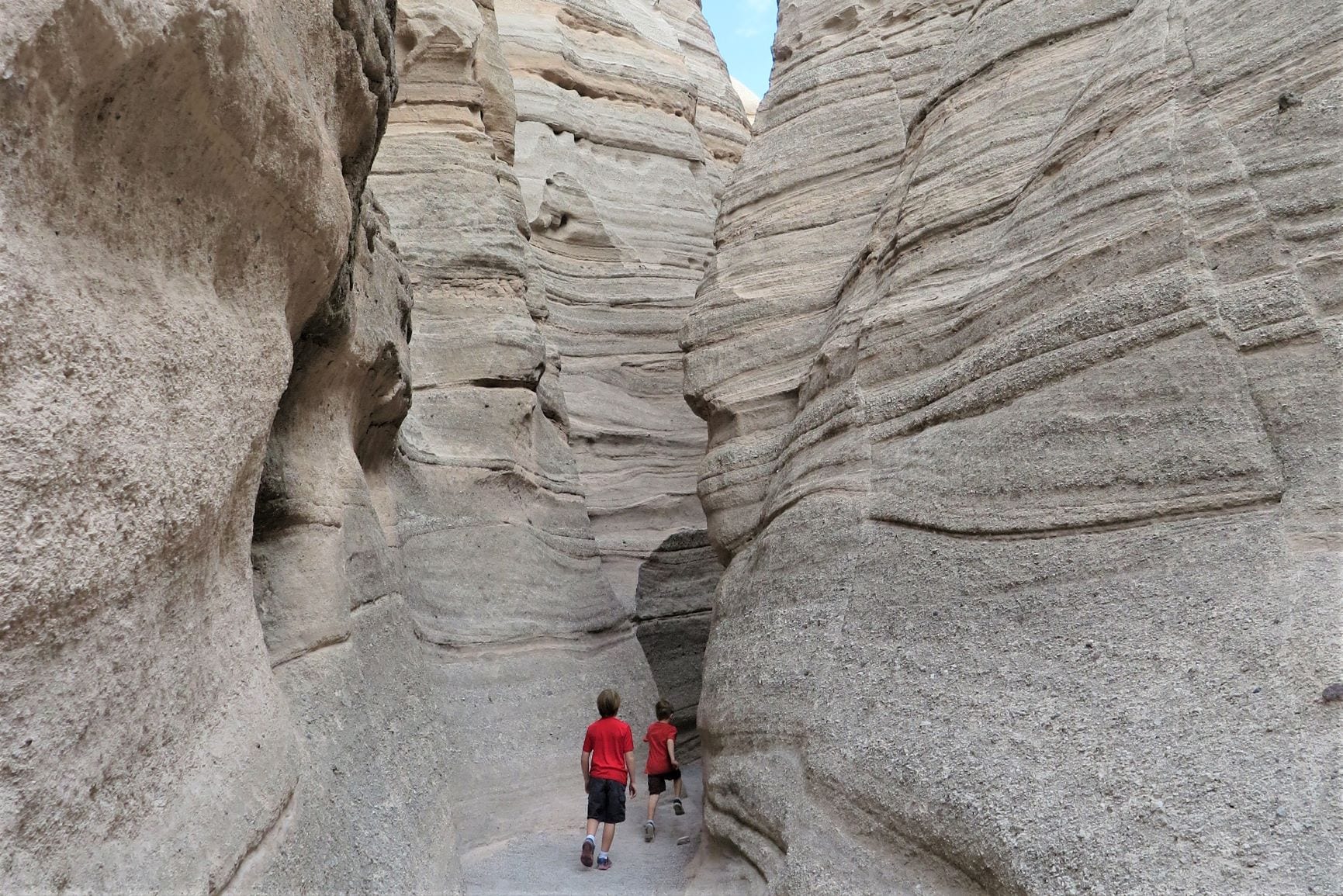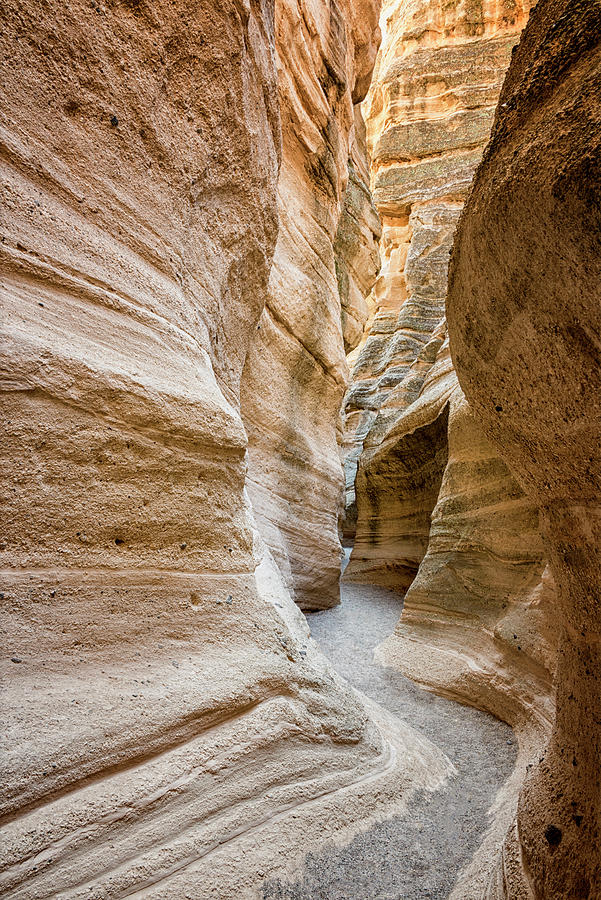Slot Canyon Tent Rocks
| Kasha-Katuwe Tent Rocks National Monument | |
|---|---|
| Location | Sandoval County, New Mexico, United States |
| Nearest city | Cochiti Pueblo, NM |
| Coordinates | 35°39′37″N106°24′30″W / 35.66028°N 106.40833°WCoordinates: 35°39′37″N106°24′30″W / 35.66028°N 106.40833°W |
| Area | 5,402 acres (21.86 km2)[1] |
| Established | January 17, 2001 |
| Governing body | U.S. Bureau of Land Management |
| Website | Kasha-Katuwe Tent Rocks National Monument |
Soft pumice and tuff form the base of the tent rocks. They vary in height from a few feet to 90 feet. Most of them have a distinctly conical shape and some retain their caprocks of harder stone. The cluster of Tent Rocks near the parking lot range in height from a few feet to 30 feet tall. The cone-shaped tent rock formations are the products of volcanic eruptions that occurred 6 to 7 million years ago and left pumice, ash, and tuff deposits over 1,000 feet thick. There are a couple route options: the Cave Loop (1.2 mi, easy) and the Canyon Trail (3.0 mi, moderate). I ended up doing both, starting with the loop, a nice jaunt with great vistas of the tent rocks. The Canyon Trail is really fantastic, with close up views of the rock formations and a trek through the narrow slot canyon.
Kasha-Katuwe Tent Rocks National Monument is a U.S. National Monument located approximately 40 miles (64 km) southwest of Santa Fe, New Mexico, near Cochiti Pueblo. Managed by the Bureau of Land Management (BLM), it was established as a U.S. National Monument by President Bill Clinton in January 2001. Kasha-Katuwe means 'white cliffs' in the Pueblo language Keresan.[2] The monument is a unit of the BLM's National Conservation Lands.
Geology[edit]
Kasha-Katuwe is located on the Pajarito Plateau between 5700 and 6400 feet (1737–1951 m) above sea level. The area owes its remarkable geology to layers of volcanic rock and ash deposited by pyroclastic flow from eruptions within the volcanic field of the Jemez Mountains that occurred 6 to 7 million years ago. These rock layers are assigned to the Peralta Tuff. Many of the layers are light in color, which is the origin of the monument's Keresan name. Over time, weathering and erosion of these layers has created slot canyons and tent rocks. The tent rocks are composed of soft pumice and tuff. Most of the tent rocks have a distinctly conical shape and some retain their caprocks of harder stone. The tent rocks vary in height from a few feet to 90 feet (27 m).[2]
Recreational activities[edit]
The BLM maintains hiking trails as well as parking and restrooms at the site. The Slot Canyon trail is a one-way trail covering 1.5 miles (2.4 km) through a slot canyon and up a climb of 630 feet (190 m) to a lookout point where the tent rocks may be viewed from above. The Cave Loop trail is approximately 1.2 miles (1.9 km) and leads past the base of the cliffs, near some of the tent rocks and a small cavate similar to those found at the nearby Bandelier National Monument. The Veterans' Memorial Scenic Overlook, dedicated in 2004, includes a 1 mile (1.6 km) loop trail and views of Peralta Canyon and the Jemez Mountains. The overlook is located at the end of a gravel road approximately 3.5 miles (5.6 km) west of the tent rocks and may not be accessible depending on road and weather conditions.
The monument is open for day use only and may be closed by order of the Cochiti Pueblo Tribal Governor. Considerations for hiking include the possibility of flash flooding in the slot canyons and the high altitude of the monument. The monument is closed to dogs.[2]
In popular culture[edit]
The science fiction television series Earth 2 filmed scenes at the monument.
See also[edit]
References[edit]
- ^'National Monument detail table as of April 2012'(PDF). Bureau of Land Management. Retrieved 2012-12-27.
- ^ abc'Kasha-Katuwe Tent Rocks National Monument'. Bureau of Land Management. Retrieved September 24, 2018.
External links[edit]
| Wikimedia Commons has media related to Kasha-Katuwe Tent Rocks National Monument. |
Colored Cliffs and Tent Rocks at Kasha-Katuwe Tent Rocks National Monument
After a dreary and rainy day, the sun rose behind the hills signaling a warmer day at Pueblo de Cochiti. In the mid-morning, when the temperature rose to about 50ºF, we headed to the nearby Kasha-Katuwe Tent Rocks National Monument for a hike. We were here in April of this year and was captivated by its fairy tale landscape. We came back to revisit it like old friends. The sun cast lights to the multi-colored cliffs behind the drifting clouds from time to time, changing the hues and shades of the cliffs. The fast moving fluffy clouds above the cliffs made this picturesque landscape more dramatic. A small garner snake and a tarantula crossed the trail. What a beautiful day for a hike!

Slot Canyon Tent Rocks New Mexico


Slot Canyon Tent Rocks
Volcanic eruptions from Jemez spewed rock fragments and ash over here 6 to 7 million years ago. Layers upon layers of volcanic debris deposited here and were fused to rocks. Erosion from water, ice, and wind carved this unique landscape. The Slot Canyon Trail is a one mile trail to the summit. There were several tall ponderosa pine trees in the canyon. An old ponderosa pine has an exposed root system about 6 feet above the ground. At some section, the Slot Canyon is so narrow that only one person can walk through. As I walked through the Slot Canyon, a narrow sunbeam lit up the channel among the towering canyon walls, and a small patch of the sky could be seen above the canyon. Water carried debris down the canyon and carved the walls with grooves and concaves.

Slot Canyon Tent Rocks

Ducked down and went through a wide hole in the canyon, we came out of the narrow section of the canyon. Up on the hillside stood an army of cone shaped tent rocks. Lines, grooves, and holes present on this group of tent rocks. Some of the tent rocks have cap rocks that resist to erosion and protect the rock below. The trail zigzags up the canyon. A couple of cone shaped tent rocks stood right by the trail. Further up, a hoodoo sits on top of a layer cake shaped rock formation. Sometimes the trail narrows to one foot wide.
Climbing up the hill, we observed the giant tent rocks at eye level within short distance. The whimsical shapes of the tent rocks are unique. As we climbed higher, the group of tent rocks in the canyon looked like castles. Cream, tan, and copper colored wavy bands decorate the cliffs. The most difficult part of the trail is a drop about 3 feet tall. Only one person could cross that drop at a time. After that, the trail is on the hillside. Just a short hike up the hill is the summit. The wonderful vista is the reward after walking across the ridge to the tip of the mesa. Looking down there lies the Cave Loop Trail below. Looking to the side are the multi-colored cliffs surrounding the trail. In the distance are Cochiti Lake, Jamaz, and Sandia mountains. On the horizon looms the Sangre De Cristo above Santa Fe.
Sunshine on the Tent Rocks in Slot Canyon
Tent Rocks Slot Canyon Trail
Walking back and getting close to the edge of the cliff, guided by the sunlight, my eyes traced the rock formations highlighted by the moving sunbeams. I was mesmerized by this place again. It is a geological treasure indeed.